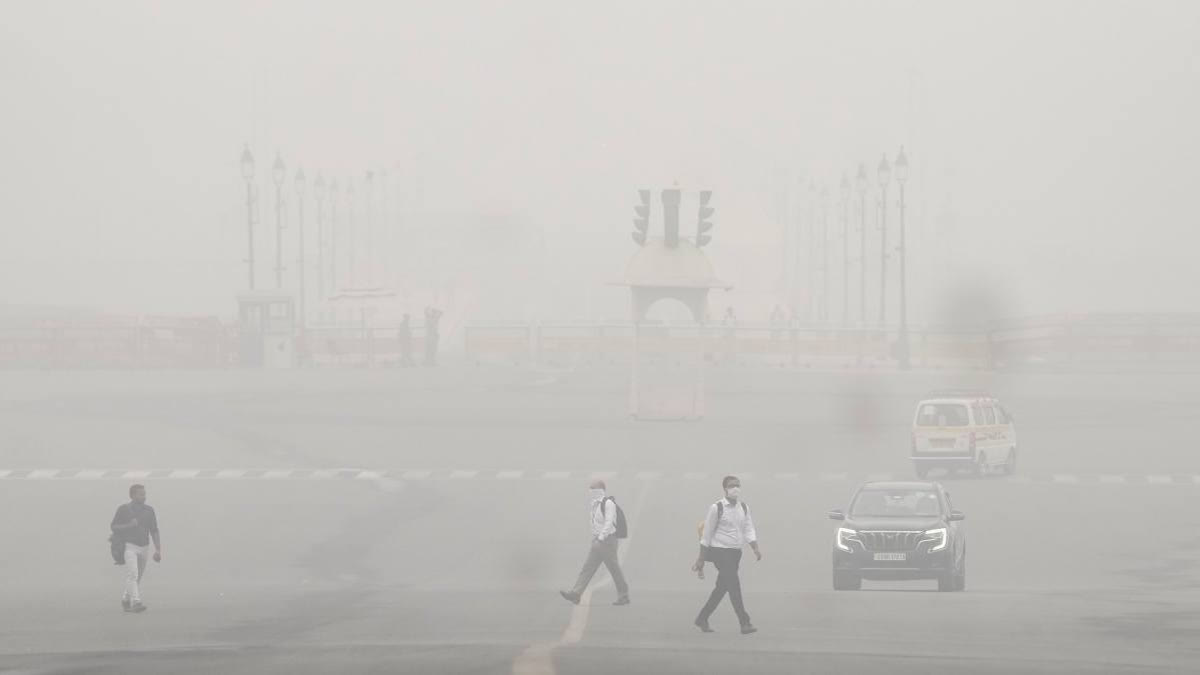New Delhi: As thick blanket of smog engulfed the Delhi-National Capital Region (NCR) on Monday morning with the air quality index (AQI) plummeting to the "severe-plus" category, authorities announced stricter pollution with the imposition of GRAP-4 control measures. The Air Quality Index (AQI) soared to 481 at 7 am on Monday.
This alarming level has alarming health implications, particularly for vulnerable populations. According to the Central Pollution Control Board, the majority of Delhi’s 39 monitoring stations recorded AQI readings above 450. Neighbouring regions reported varying levels of air pollution, Noida's air was in the 'very poor' category with an AQI of 384, Faridabad registered 'poor' at 320, while Ghaziabad and Gurugram faced 'severe' conditions with AQIs of 400 and 446, respectively.
The India Meteorological Department (IMD) issued an Orange Alert for dense fog. The fog has further exacerbated the situation by significantly reducing visibility. The combination of fog and toxic air has disrupted flight operations, causing widespread delays. Despite stringent measures to curb pollution, Delhi remains engulfed in smog, with locals describing the city as a "gas chamber". The situation has worsened leaving citizens struggling to breathe in the toxic air.
Sensing the gravity of the situation, Delhi government announced the suspension of in-person classes for all except for students of classes 10 and 12, the , as the city choked under alarming levels of pollution for the sixth straight day.
The announcement came hours after the Commission for Air Quality Management (CAQM) invoked stricter pollution control measures for the Delhi-NCR under Stage 4 of the Graded Response Action Plan, or GRAP, effective from 8 am on Monday.
The Directorate of Education directed all heads of government and private schools to ensure that the offline classes for students up to class 9, and class 11, do not take place until further order.
"All the Heads of government, government aided and unaided private recognised schools of DoE, MCD, NDMC and DCB in Delhi are hereby directed to ensure that the physical classes for all students upto (sic) class nine and class eleven is (sic) to be discontinued from November 18 until further orders," the DoE stated in a circular.
In-person classes for students of class 10 and class 12 will continue as usual, it said. "With the imposition of GRAP-4 from tmrw, physical classes shall be discontinued for all students, apart from Class 10 and 12. All schools will hold online classes, until further orders," Chief Minister Atishi also said in a post on X.
Delhi's Air Quality Index (AQI) worsened on Sunday, reaching 441 at 4 pm and rising to 457 by 7 pm due to unfavourable weather conditions. According to the government's order, no trucks will be allowed into Delhi except for those carrying essential items or using clean fuel (LNG/CNG/BS-VI diesel/electric).
Non-essential light commercial vehicles registered outside Delhi will also be prohibited, except for electric vehicles and CNG and BS-VI diesel ones. Delhi-registered BS-IV or older diesel medium and heavy goods vehicles are banned, except for those in essential services, the panel said.
Emergency measures under stage 4
Stage 4 of GRAP, the strictest level, involves a slew of emergency measures aimed at curbing pollution and mitigating health risks. These include:
Vehicle restrictions
Suspension of entry for all truck traffic into Delhi, except for those carrying essential commodities or services. Only LNG/CNG/electric and BS-VI diesel trucks will be allowed.
Prohibition on light commercial vehicles (LCVs) registered outside Delhi, except for EVs and CNG vehicles carrying essential items.
Ban on Delhi-registered diesel-operated medium and heavy goods vehicles, except those providing essential services.
Construction and infrastructure projects
A complete halt to construction and demolition (C&D) activities, extending to public projects such as roads, highways, flyovers, power transmission lines, and pipelines.
Workplace adjustments
